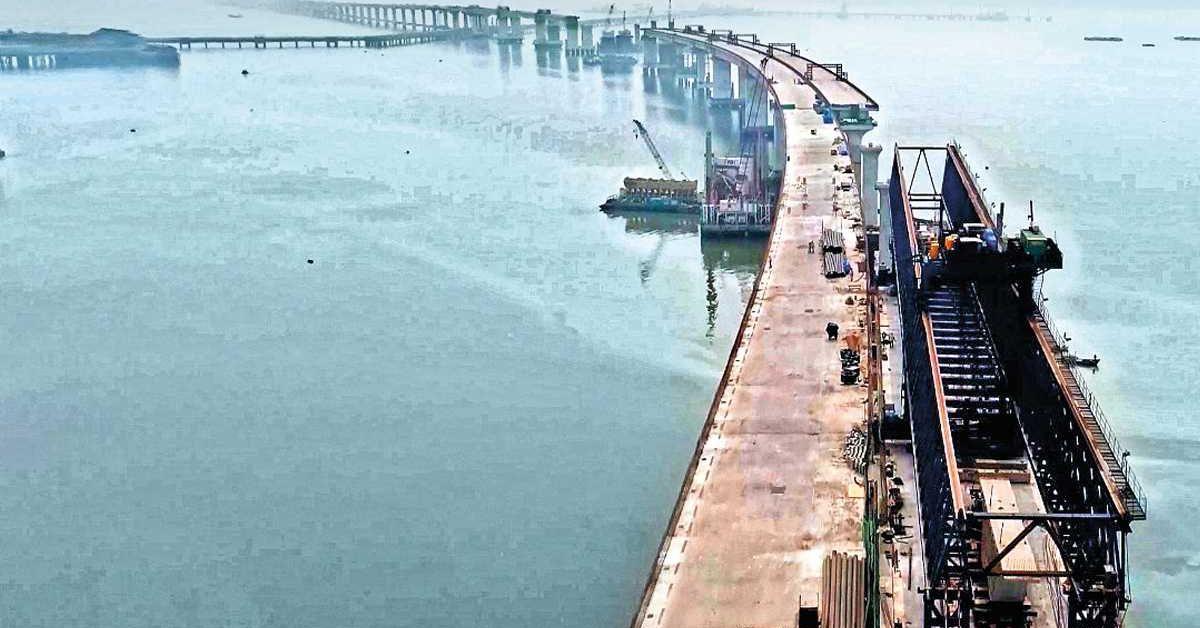Below are the details of the projects and their anticipated opening.
MUMBAI TRANS HARBOUR LINK
The Mumbai Trans Harbour Link is an engineering megastructure. Spanning almost 22 km long, it is the longest sea bridge to be constructed in India and will link Mumbai city with the mainland Navi Mumbai. The sea bridge is scheduled to be inaugurated by Prime Minister Narendra Modi on 12th January.
The plan for undertaking a horizontal link has been in the making for over a decade and in the last few years it has gathered momentum. The six lane bridge will start from Sewri in South Mumbai and terminate at Chirle near Nhava Sheva.
Implemented by the Mumbai Metropolitan Region Development Authority, the project has been categorized as a Regional Development Project and is being built at a cost of about Rs. 18,000 crore.
Among the major benefits of the project will be the economic development of Navi Mumbai and part of Raigad District as well as faster connectivity with the upcoming Navi Mumbai International Airport. Once fully operational, the sea bridge is expected to provide a major fillip to the connectivity and economic development of the Mumbai Metropolitan Region.
NAVI MUMBAI INTERNATIONAL AIRPORT
Currently being developed and to be operated by Adani Airports Holdings Ltd, Navi Mumbai International Airport is expected to address much needed capacity enhancement in the Mumbai Metropolitan Region. The greenfield airport will be able to handle 20 million passengers per annum under Phase 1, which is expected to be completed by the end of 2024.
Adani Enterprises manages its airport operations through Adani Airport Holdings, which has a mandate to operate six airports – Ahmedabad, Lucknow, Mangaluru, Jaipur, Guwahati and Thiruvananthapuram – as well as Mumbai and greenfield Navi Mumbai International Airport.
Navi Mumbai International Airport project is being developed in multiple phases and will have a total capacity of 60 million passengers per annum and 800,000 tons per annum of cargo handling capacity and is being developed at a cost of about Rs. 17,000 crore.
NOIDA INTERNATIONAL AIRPORT
Scheduled to be operational by Oct-Dec quarter in 2024, Noida International Airport will initially serve 12 million passengers per annum in Phase 1 and reach up to 70 million-passenger capacity by end of Phase 4 of development.
Noida International Airport will be managed and operated by Yamuna International Airport Pvt Ltd, a 100% subsidiary of Zurich Airport International AG, which has been incorporated to develop the greenfield airport in Jewar, a suburb of Greater Noida. Zurich Airport International operates eleven airports in the world and plans to incorporate ‘Swiss Efficiency’ and Indian hospitality to ensure quick turnaround and low operational cost.
The masterplan envisages development of two runways, two terminals, cargo handling capacity of up to 2 million tonnes (Phase 4), real estate development in 167 acres of land, among other.
The company will invest about Rs. 5,700 crores in the development of the first phase and manage the airport for a concession period of 40 years. Once completed the airport is slated to become the largest airport in Asia.
AQUA LINE 3 OF MUMBAI METRO NETWORK
The 33.5-KM Aqua line 3 of Mumbai’s Metro Network is completely underground and will be running along Colaba-Bandra-SEEPZ corridor connecting the city’s financial hubs such as Nariman Point, Bandra-Kurla-Complex, Fort, Worli, Lower Parel, Goregaon. The entire route is expected to be operational in 2024, with Phase 1 likely operational by April.
Mumbai Metro Rail Corporation Ltd is the nodal body which is implementing the project, a joint venture between Government of India and Government of Maharashtra. The project is estimated to cost about Rs 33,000 crore and has received funding from several entities which include Japan’s technical and lending agency Japan International Cooperation Agency or JICA.
According to MMRCL, the metro line will serve more than 16 lakh commuters daily, leading to reduction in travel time in a heavily congested city. Upon completion, the fully underground North-South metro corridor will have 27 stations and interchange points linking with the city’s famous suburban railway, Monorail and ‘Versova-Andheri-Ghatkopar’ Metro-1, which connects the city East to West.
MUMBAI COASTAL ROAD
Brihanmumbai Municipal Corporation has envisaged the Mumbai Coastal Road Project along the Western Seafront of the city to decongest the existing roads. According to BMC, the objective of the project is to provide an alternate North-South Trunk route for the people of Mumbai and improve connectivity in the city. The project will complement the 33.5 KM underground Aqua Line 3 of Mumbai Metro, which will connect Cuffe Parade to Aarey and improve mobility between North and South Mumbai.
Phase 1 of the Mumbai Coastal Road Project is a 9.98 km long section from Princess Street Flyover at Marine Lines to the Worli end of the Bandra-Worli Sea Link involving sea front development and is a first-of-its-kind in India. Phase 1 is expected to be completed in the first half of 2024 and project cost is estimated at about Rs. 13,000 crore.
The coastal road project comprises challenging engineering work which includes land reclamation, construction of tunnels, bridges and flyovers as well as interchanges.







